What is Celecoxib Celebrex?
Celebrex is an anti-inflammatory medicine that belongs to a group of drugs COX-2 inhibitors. The prostaglandins responsible for pain and inflammation are natural substances made by the body. Other prostaglandins are known to protect the stomach lining, however, Celebrex does not affect the protective prostaglandins of the stomach when administered correctly. Celebrex is used for symptom relief in the treatment of osteoarthritis or rheumatoid arthritis. celecoxib 100mg
How does it work?
Celebrex works by reducing the amount of prostaglandins made by the body that cause pain and inflammation through blocking the prostaglandins enzymes and helping you feel relief from discomo and inflammation. why celecoxib is banned uk
What are the benefits of taking it?
Celecoxib is indicated in clinical practice for acute pain from trauma, osteoarthritis and other forms of acute arthritis, menstruation pain. It has been observed to reduce the number of polyps in the colon and rectum of patients with familial adenomatous polyposis. Its original indication was to reduce pain and inflammation while minimizing the gastrointestinal side effects characteristic of NSAIDs. celecoxib dosage
How do I use it and its dosage?
Your doctor will indicate the dose to take. Since the risk of adverse effects associated with heart problems may increase with the dose and duration of treatment, it is important that
you use the lowest dose that controls your pain and you should not take Celebrex longer than necessary to control symptoms. why celecoxib is banned
Celecoxib tablets must be administered orally. The capsules are taken at any time of the day, with or without food. However, try to take each dose of Celebrex at the same time each day. celecoxib nhs
If you have trouble swallowing the capsules: You can spread the entire contents of the capsule on a level teaspoon of some semi-solid food (such as applesauce, rice, yogurt, or crushed banana cold or at room temperature) and immediately swallow it with a glass of plain water. approximately 240 ml. celecoxib uk
To open the capsule, hold it upright to keep the granulate at the bottom; then squeeze the top and twist to remove it, being careful not to spill the contents. Do not chew or crush the granules. Contact your doctor if, after two weeks from the start of treatment, you do not experience improvement. celecoxib dose
The recommended dose is:
The recommended dose for the treatment of osteoarthritisis 200 mg a day, if necessary, your doctor can increase it to a maximum of 400 mg.
The dose is usually one 200 mg capsule once a day.
The recommended dose for the treatment of rheumatoid arthritisis 200 mg daily, if necessary, your doctor can increase it to a maximum of 400 mg.
The dose is usually: one 100 mg capsule twice a day.
The recommended dose for the treatment of ankylosing spondylitisis 200 mg daily, if necessary, your doctor can increase it to a maximum of 400 mg.
The dose is usually: one 200 mg capsule once a day.
Kidney or liver problems:Make sure your doctor knows if you have liver or kidney problems since you may need a lower dose.
Patients over 65, especially those under 50 kg: Your doctor may want to monitor you more closely if you are over 65 and especially if you weigh less than 50 kg.
You should not take more than 400 mg a day.
Use in children:Celebrex is for adults only, it is not indicated in children.
Side effects & precautions
If any of the following side effects occurs, stop taking Celebrex and tell your doctor immediately:
- an allergic reaction such as a rash, swelling of the face, wheezing, or difficulty breathing.
- heart problems like chest pain
- severe stomach pain or any sign of bleeding in the stomach or intestines, such as dark urine or bloody stools, or blood in the vomit.
- a skin reaction such as a rash, blisters, or peeling skin.
- liver failure [symptoms may include nausea (feeling sick), diarrhea, jaundice (your skin or the whites of your eyes appear yellow)].
Very common side effects: these may affect more than 1 in 10 patients:
- Increased blood pressure, including worsening of existing high blood pressure Common side effects: may affect up to 1 in 10 patients:
- Heart attack*
- Fluid retention with swelling of the ankles, legs and / or hands
- Urinary infections
- Difficult breathing *, sinusitis (inflammation and infection of the sinuses, obstruction or pain of the sinuses), stuffy or runny nose, sore throat, cough, cold, flu-like symptoms
- Dizziness, difficulty sleeping
- Vomiting *, stomach pain, diarrhea, indigestion, gas
- Rash, itching
- Muscular stiffness
- Difficulty to swallow*
- Headache
- Nausea (feeling sick)
- Joint pain
- Worsening of existing allergies
- Accidental injury
Uncommon side effects: may affect up to 1 in 100 patients:
- Ictus
- Heart failure, palpitations (perception of heart beat), acceleration of heartbeat
- Liver related blood test abnormalities
- Kidney related blood test abnormalities
- Anemia (changes in red blood cells that can cause fatigue and difficulty breathing)
- Anxiety, depression, tiredness, numbness, tingling sensation
- High levels of potassium in blood test results [may cause nausea (feeling sick), fatigue, muscle weakness, or palpitations]
- Blurred or altered vision, ringing in the ears, pain and mouth sores, difficulty hearing
- Constipation, belching, inflammation of the stomach (indigestion, stomach pain or vomiting), aggravation of inflammation of the stomach or intestine
- Leg cramps
- Itchy and raised rash (hives)
- Inflammation of the eye
- Difficulty breathing
- Discoloration of the skin (bruises)
- Chest pain (general non-heart pain)
- Swelling of the face
Rare side effects: may affect up to 1 in 1,000 patients:
- Ulcers (bleeding) in the stomach, throat or intestines; or rupture of the intestine (can cause stomach pain, fever, nausea, vomiting, intestinal obstruction), dark or black stools, inflammation of the pancreas (can lead to stomach pain), inflammation of the throat (esophagus)
- Low sodium levels in the blood (a condition known as hyponatremia)
- Decreased number of white blood cells (which help protect the body from infection) and platelets (increased chance of bleeding and bruising)
- Difficulty in muscle coordination of movements
- Confused feeling, taste disturbances
- Increased sensitivity to light
- Hair loss
- Hallucinations
- Ocular hemorrhage
- Acute reaction that can lead to lung inflammation


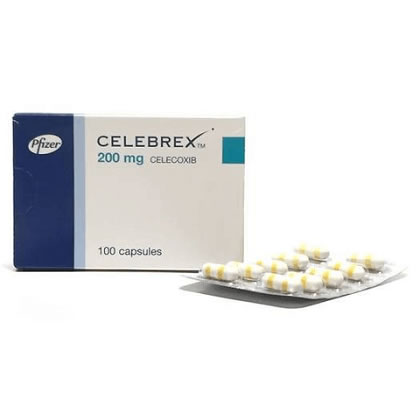
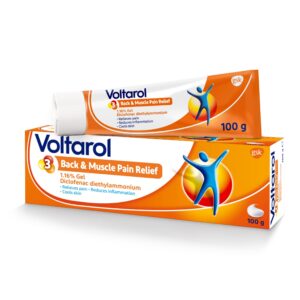
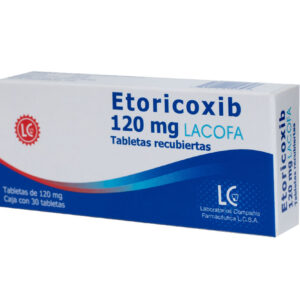
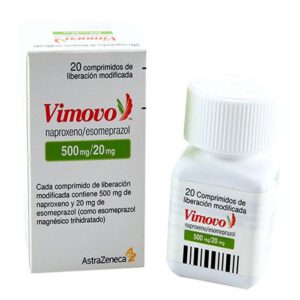
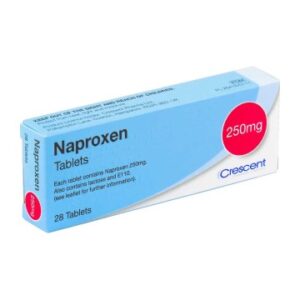
Reviews
There are no reviews yet.